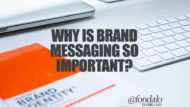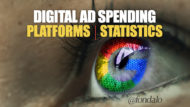Business to business brands have always had slightly more challenging digital obstacles than that of their retail counterparts. As the B2B market has matured online, these challenges have combined with scaled expectations from their buyers and brands need to be aware of what that looks like. This is especially true when their buyers have come to expect retailer-like digital experiences that most business brands are simply not achieving well.
So what do B2B brands need to know about digital experiences?
What Are B2B Digital Experiences
Digital experiences are similar whether it is a retail or wholesale brand property. From user interface, information gathering on a product or service, social media content, as well as making a purchase online, these experiences combine to create the entire digital experience that a current or prospective customer has when engaging your brand in various ways.
Make no mistake about it. The perception of the digital experience that your business customer has with your brand will have as much impact on their eventual purchase decision as the features, benefits, and price of your product and service.
B2B Experiences Are A Bit Different
Though the digital experience expectations are similar from retail to business to business, the function and requirements can be exceedingly different. For example, B2B products are often significantly more complicated and costly as compared to a typical retail product. Therefore the buying cycle, budgetary concerns, and decision process involve a far more complex path.
B2B purchases involve more people, have much higher costs and substantially more complex products, which means that the path of the digital experience, as well as the complexities within them, have to be different. At the same time, the changing expectations of the business buyer to be much more retail-like requires that the execution of the B2B digital experience to evolve.
The Digital Experience Challenges For B2B Brands
In a recent study conducted by Episerver, 700 decision-makers in B2B companies were surveyed in order to determine their plans, tactics, and concerns about meeting customer digital experience expectations. Some of the data obtained in their study should cause many B2B brands to start to rethink what they are doing. Let’s dive into some of the findings of the digital experience study conducted by Episerver.
Rising Digital Expectations
 The number one digital threat identified in the report is the rising digital expectations of B2B customers. In fact, the study found that 84% of B2B decision-makers are saying that this rising expectation from their customers and/or partners is their top external threat. Just like retail consumers, business buyers are increasingly expecting more effortless interactions, even if they struggle to deliver them at their own company.
The number one digital threat identified in the report is the rising digital expectations of B2B customers. In fact, the study found that 84% of B2B decision-makers are saying that this rising expectation from their customers and/or partners is their top external threat. Just like retail consumers, business buyers are increasingly expecting more effortless interactions, even if they struggle to deliver them at their own company.
Some of these more frictionless experiences desired by B2B customers are as follows:
- 41% of B2B buyers say self-service functionality would make it easier to do business online
- in addition to pricing on the website (44%)
- easy scheduling with a salesperson (37%)
Top 3 Digital Experience Technologies
In order to impact their future digital experiences positively, B2B brands interviewed listed the top technologies that their company will most likely invest in next. According to the report, these are:
- web analytics or business intelligence (51%)
- an email marketing system (49%)
- and a B2B ecommerce platform (38%).
Funding For Digital Experience Transformation
The study did uncover that adequate funding is a significant obstacle preventing brands from delivering on digital experience transformation. In fact, 50% of B2B decision-makers lack funding from senior management to execute digital transformation programs. 57% agree their company has a culture resistant to change and new digital technologies.
If your brand culture is resistant to improving digital experiences inline with your customer expectations, you may soon be in trouble. Both proper funding and senior executive back must come inline in order for B2B brands to deliver experiences that the customer is demanding.
Digital Commerce For B2B’s
The survey highlighted that a full 72% of respondents said that by 2025 the majority of their company revenue will come from frictionless B2B ecommerce websites. In other words, customers want the information, ability, and infrastructure to make decisions and pull the trigger outside of a sales rep and controlled process for features, pricing, and technical information. The report showed that this is already something that B2Bs are planning for and that direct, online selling paths to customers is their future revenue source.
Personalization
Finally, the most crucial digital experience upgrade obstacle that B2B brands are tackling appears to be website personalized content. Brands said that they plan to adopt site personalization within the next 12 months (36%) followed by improvements to their mobile digital experiences (33%).
The B2B market is substantially different than the typical retail business model, however business brands need to understand that the same consumers that have high expectations are also their business customers. The times are changing and therefore the requirements placed on B2B brands to make significant digital experience improvements are here.
How is your brand making improvements to the digital experiences you are delivering to your customers?







